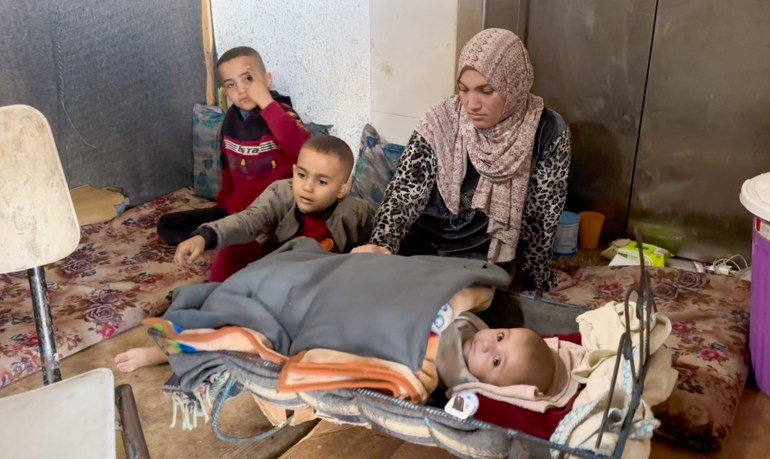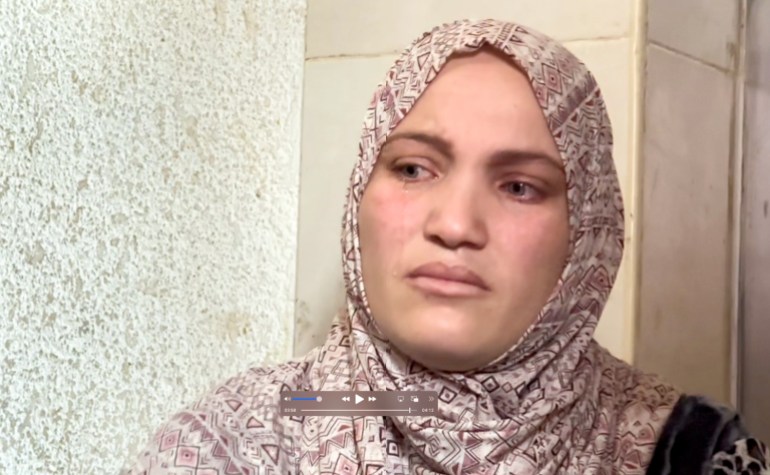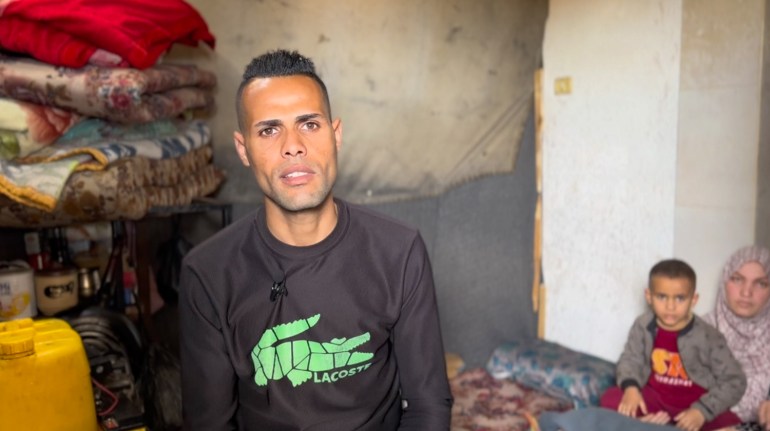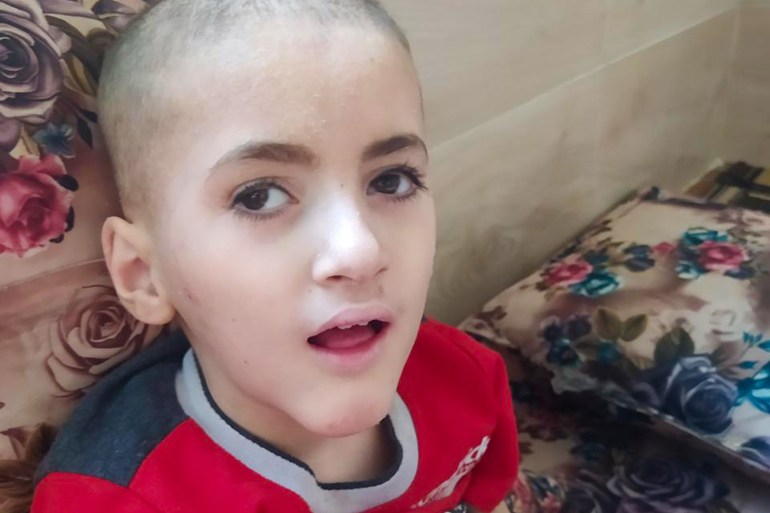
[ad_1]
Rafah, Gaza – The loss of nine-year-old Yazan, or Yazouna as his mother called him, hangs like a dark cloud over the el-Kafarna family’s tiny living space.
They huddle together in a shelter that Sharif el-Kafarna rigged up out of bits of wood, cardboard and sheeting in front of the third-floor door to the elevator in an UNRWA school in Rafah.
It is tidy inside and a string of Ramadan bunting hangs on one wall, but nothing can hide the fact that the family of five sleeps, prays, eats and spends all day in a space about eight metres square (80 feet square).
Breaking down, his mother wept: “This is our first Ramadan without Yazan, God has ordained this for us and we cannot complain, we can only praise him and have faith.”
Yazan died on March 4 at the Abu Youssef al-Najjar Hospital in Rafah, hooked up to breathing machines and IV drips, his body having wasted away to nothing during five months of relentless war during which his family ran from one supposed “safe place” to another, terrified, destitute and hungry.
He would have turned 10 on June 4.

A protected childhood
Yazan was diagnosed with cerebral palsy as a month-old infant, amid an earlier Israeli assault on the Gaza Strip in 2014.
His parents took great pains to structure his life in Beit Hanoon where they lived before the war so he had the food, supplements and healthcare he needed.
“Yazan needed special vitamin mixes for his mental acuity and these injections to keep his body strong, as well as physiotherapy which he needed regularly.”
“He needed healthy food as well, eggs, vegetables, fruits, dairy. He would also eat baby cereal and we would puree foods for him so he could eat,” his father, Sharif said.
He also received physiotherapy at home by therapists from various associations who would visit the family home regularly. There were also therapists who worked with him to provide psychological support and some basic learning.
“He enjoyed his sessions, you could see it in his eyes. He would smile, sometimes he’d clap, too, and his eyes would follow what was happening, like the trainers talking to him or shows on a screen that we’d show him,” his father said.
The little boy was thriving, and his parents celebrated him as much as they protected him.

“We’d have birthday parties for Yazan. He would smile, he would clap when he heard music, he was moving well, thank God.
“We’d do the whole thing, with a birthday cake and party food, just like we did for the other kids,” his mother said.
Understanding and love
The couple has three surviving children, eight-year-old Mouin, four-year-old Wael and four-month-old Mohamed, who was born weeks after Israel began its assault on Gaza on October 7.
Mouin was the closest of the brothers to Yazan, his mother told Al Jazeera.
“He would sit with him and watch him for me when I had to be in another room. He didn’t change his diapers or anything like that, but he would spend hours with him just watching something or chattering,” she said.
Because Yazan could not speak, he made different sounds depending on what he needed, his father said.
“I couldn’t understand what he wanted to, well, his mum was the one who knew what he wanted based on the sound he was making,” he said.
Yazan’s mother smiled fondly at the memory of her relationship with her eldest.
“He was closer to me … such a good kid, our relationship was great and I always understood him. He’d make a particular noise when he was hungry, another one if he was startled.

“I took him with me everywhere, to market, to my family’s places, he just came along. We went to the beach, too, but I didn’t put him in the sea because I always worried he’d get too cold, I’d just bathe him in the tub.”
Memories of that past life bring fleeting smiles to her face as she describes their two-bedroom home with its big living room and kitchen where the children had space to play – now they huddle with their parents in a tiny space all day.
“Fridays we’d have a big family meal, then take our afternoon siestas and go out to visit our families, either we’d go to my family or to my in-laws’,” she said.
Sharif used to work as a driver, earning enough money to provide everything the family needed, especially Yazan.
“I tried to do the same here,” he said. “We’re from Beit Hanoon, we were displaced to Jabalia, then Nuseirat, then Deir el-Balah, and when we got here, I made sure we had our own space, so Yazan would be as comfortable as I could manage for my son,” Sharif continued.
War brings the beginning of the end
“I was so happy when I was watching my son growing day by day when he had the food and medicines he needed. But then when the war started, he couldn’t get the treatment or the right food any more,” Sharif said.

They tried, he continued, as hard they could to secure what Yazan needed to survive – soft, nutritious food that could be eaten by the little boy – but first, the supplies dwindled, then the black market prices rose alarmingly, then finally, there was no more of the food to be found.
Yazan’s health began to deteriorate in front of his parents’ horrified eyes as they carried him in their arms from one supposed “safe” place of displacement to another.
No amount of softened bread scraps they gathered for him could help keep him alert and strong, and his already thin frame began to waste away.
“He started to deteriorate day after day. We didn’t have enough medicine so I’d try to skip days to make what we had stretch further,” his father said sadly.
“We took him to the hospital and he lived his last days on life support at Abu Youssef al-Najjar Hospital. By then he was no longer able to respond to anything, not even his mother.”
Yazan spent 11 days in the hospital before he died on March 4.
“I can never forget Yazan,” his mother said, in tears.
“He’s in my heart and mind every minute of every day. Look at what’s happening to our children!”
[ad_2]
Source link
